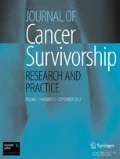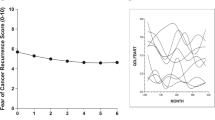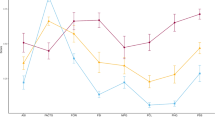Abstract
Purpose
The purpose of this study was to determine whether fear of cancer recurrence (FCR) is associated with greater health care utilization (HCU) in early-stage breast cancer survivors.
Methods
Three hundred early-stage breast cancer survivors diagnosed within the past 7 years reported on FCR as well as calls and visits to oncology providers and primary care providers during the preceding 3 months. Participants also reported on use of mental health services and psychotropic medications since diagnosis. Structural equation modeling was used to create a latent FCR factor and evaluate this factor as a predictor of various HCU outcomes controlling for age at diagnosis, years since diagnosis, generalized anxiety, objective risk of recurrence, and number of comorbidities.
Results
FCR predicted more visits to both oncology providers (RR = 1.53, p = .002) and primary care providers (RR = 1.31, p = .013), as well as more phone calls to oncology providers (RR = 2.08, p = .007). FCR was not a significant predictor of phone calls to primary care providers (RR = 1.39, p = .054), utilization of mental health treatment (OR = 1.27, p = .362), or use of psychotropic medications (OR = 1.37, p = .178).
Conclusions
FCR was associated with increases in some types of HCU, which may reflect excessive medical reassurance-seeking and lead to unnecessary medical costs.
Implications for Cancer Survivors
FCR is a serious concern that warrants greater attention to reduce distress-related health care utilization. Utilization of mental health services to address FCR may represent higher-value health care.

Similar content being viewed by others
Notes
The FCRI Severity subscale has been used in previous research as an indicator of clinically-significant FCR; when items are scaled from 0-4 and summed, a score of 13 or greater is indicative of clinical levels of FCR [26]. To facilitate comparisons to past work, we provide descriptive information about FCR scores based on these clinical guidelines: In the present sample, mean FCRI Severity score was 14.97 (SD = 7.77). Over half of patients (53.9% in the present sample scored 13 or greater on the FCRI Severity subscale and would therefore be considered to have clinical levels of FCR.
References
Simard S, Savard J, Ivers H. Fear of cancer recurrence: specific profiles and nature of intrusive thoughts. J Cancer Surviv. 2010;4(4):361–71. https://doi.org/10.1007/s11764-010-0136-8.
Mehnert A, Berg P, Henrich G, Herschbach P. Fear of cancer progression and cancer-related intrusive cognitions in breast cancer survivors. Psychooncology. 2009;18(12):1273–80. https://doi.org/10.1002/pon.1481.
Simard S, Thewes B, Humphris G, Dixon M, Hayden C, Mireskandari S, et al. Fear of cancer recurrence in adult cancer survivors: a systematic review of quantitative studies. J Cancer Surviv. 2013;7(3):300–22. https://doi.org/10.1007/s11764-013-0272-z.
van den Beuken-van Everdingen MHJ, Peters ML, de Rijke JM, Schouten HC, van Kleef M, Patijn J. Concerns of former breast cancer patients about disease recurrence: a validation and prevalence study. Psychooncology. 2008;17(11):1137–45. https://doi.org/10.1002/pon.1340.
Deimling GT, Bowman KF, Sterns S, Wagner LJ, Kahana B. Cancer-related health worries and psychological distress among older adult, long-term cancer survivors. Psychooncology. 2006;15(4):306–20. https://doi.org/10.1002/pon.955.
Simonelli LE, Siegel SD, Duffy NM. Fear of cancer recurrence: a theoretical review and its relevance for clinical presentation and management. Psychooncology. 2017;26:1444–54. https://doi.org/10.1002/pon.4168.
Lee-Jones C, Humphris G, Dixon R, Bebbington Hatcher M. Fear of cancer recurrence: a literature review and proposed cognitive formulation to explain exacerbation of recurrence fears. Psychooncology. 1997;6:95–105.
Fisher CS, Martin-Dunlap T, Ruppel MB, Gao F, Atkins J, Margenthaler JA. Fear of recurrence and perceived survival benefit are primary motivators for choosing mastectomy over breast-conservation therapy regardless of age. Ann Surg Oncol. 2012;19(10):3246–50. https://doi.org/10.1245/s10434-012-2525-x.
Lebel S, Tomei C, Feldstain A, Beattie S, McCallum M. Does fear of cancer recurrence predict cancer survivors’ health care use? Support Care Cancer. 2013;21(3):901–6. https://doi.org/10.1007/s00520-012-1685-3.
Cannon AJ, Darrington DL, Reed EC, Loberiza FR. Spirituality, patients’ worry, and follow-up health-care utilization among cancer survivors. J Support Oncol. 2011;9(4):141–8. https://doi.org/10.1016/j.suponc.2011.03.001.
Thewes B, Butow P, Bell ML, et al. Fear of cancer recurrence in young women with a history of early-stage breast cancer: a cross-sectional study of prevalence and association with health behaviours. Support Care Cancer. 2012;20(11):2651–9. https://doi.org/10.1007/s00520-011-1371-x.
Sarkar S, Sautier L, Schilling G, Bokemeyer C, Koch U, Mehnert A. Anxiety and fear of cancer recurrence and its association with supportive care needs and health-care service utilization in cancer patients. J Cancer Surviv. 2015;9(4):567–75. https://doi.org/10.1007/s11764-015-0434-2.
Katz ML, Donohue KA, Alfano CM, Day JM, Herdon JE, Paskett ED. Cancer surveillance behaviors and psychosocial factors among long-term survivors of breast cancer. Cancer. 2009;115(3):480–8. https://doi.org/10.1002/cncr.24063.
Lash TL, Clough-Gorr K, Silliman RA. Reduced rates of cancer-related worries and mortality associated with guideline surveillance after breast cancer therapy. Breast Cancer Res Treat. 2005;89:61–7. https://doi.org/10.1007/s10549-004-1472-z.
Kelly KM, Ajmera M, Bhattacharjee S, Vohra R, Hobbs G, Chaudhary L, et al. Perception of cancer recurrence risk: more information is better. Patient Educ Couns. 2013;90(3):361–6. https://doi.org/10.1016/j.pec.2011.12.003.
Liu Y, Pérez M, Schootman M, Aft RL, Gillanders WE, Jeffe DB. Correlates of fear of cancer recurrence in women with ductal carcinoma in situ and early invasive breast cancer. Breast Cancer Res Treat. 2011;130(1):165–73. https://doi.org/10.1007/s10549-011-1551-x.
Thewes B, Butow P, Zachariae R, Christensen S, Simard S, Gotay C. Fear of cancer recurrence: a systematic literature review of self-report measures. Psychooncology. 2012;21(6):571–87. https://doi.org/10.1002/pon.2070.
Lebel S, Ozakinci G, Humphris G, et al. From normal response to clinical problem: definition and clinical features of fear of cancer recurrence. Support Care Cancer. 2016;24(8):3265–8. https://doi.org/10.1007/s00520-016-3272-5.
Simard S, Savard J. Fear of Cancer recurrence inventory: development and initial validation of a multidimensional measure of fear of cancer recurrence. Support Care Cancer. 2009;17(3):241–51. https://doi.org/10.1007/s00520-008-0444-y.
Vickberg SMJ. The concerns about recurrence scale (CARS): a systematic measure of women’s fears about the possibility of breast cancer recurrence. Ann Behav Med. 2003;25(1):16–24.
Meyer TJ, Miller ML, Metzger RL, Borkovec TD. Development and validation of the Penn State worry questionnaire. Behav Res Ther. 1990;28(6):487–95. https://doi.org/10.1016/0005-7967(90)90135-6.
Muthén LK, Muthén BO. Mplus User’s Guide. 7th ed. Los Angeles, CA: Muthén & Muthén; 1998.
Enders CK. Applied missing data analysis. New York: Guilford Press; 2010.
Atkins DC, Gallop RJ. Rethinking how family researchers model infrequent outcomes: a tutorial on count regression and zero-inflated models. J Fam Psychol. 2007;21(4):726–35. https://doi.org/10.1037/0893-3200.21.4.726.
Atkins DC, Baldwin SA, Zheng C, Gallop RJ, Neighbors C. A tutorial on count regression and zero-altered count models for longitudinal substance use data. Psychol Addict Behav. 2013;27(1):166–77. https://doi.org/10.1037/a0029508.
Simard S, Savard J. Screening and comorbidity of clinical levels of fear of cancer recurrence. J Cancer Surviv. 2015;9(3):481–491
Dunn TJ, Baguley T, Brunsden V. From alpha to omega: a practical solution to the pervasive problem of internal consistency estimation. Br J Psychol. 2014;105(3):399–412. https://doi.org/10.1111/bjop.12046.
Elshaug AG, Rosenthal MB, Lavis JN, Brownlee S, Schmidt H, Nagpal S, et al. Levers for addressing medical underuse and overuse: achieving high-value health care. Lancet. 2017;390:191–202.
Emanuel EJ, Fuchs VR. The perfect storm of overutilization. JAMA. 2008;299(23):2789–91. https://doi.org/10.1001/jama.299.23.2789.
Hendee WR, Becker GJ, Borgstede JP, Bosma J, Casarella WJ, Erickson BA, et al. Addressing overutilization in medical imaging. Radiology. 2010;257(1):240–5. https://doi.org/10.1148/radiol.10100063.
Schnipper LE, Smith TJ, Raghavan D, Blayney DW, Ganz PA, Mulvey TM, et al. American Society of Clinical Oncology identifies five key opportunities to improve care and reduce costs: the top five list for oncology. J Clin Oncol. 2012;30(14):1715–24. https://doi.org/10.1200/JCO.2012.42.8375.
Smith MD, Saunders R, Stuckhardt L, McGinnis JM, editors. Best Care at Lower Cost: the path to continuously learning health Care in America. Washington, D.C: National Academies Press; 2012.
Stark D, Kiely M, Smith A, Morley S, Selby P, House A. Reassurance and the anxious cancer patient. Br J Cancer. 2004;91(5):893–9. https://doi.org/10.1038/sj.bjc.6602077.
American Society of Clinical Oncology. Breast cancer follow-up and management after primary treatment: American Society of Clinical Oncology Clinical Practice Guideline update. ASCO Guidelines. www.asco.org/guidelines/breastfollowup. Published 2013.
Butow PN, Turner J, Gilchrist J, et al. Randomized trial of ConquerFear: a novel, theoretically based psychosocial intervention for fear of cancer recurrence. J Clin Oncol. 2017; JCO–2017
Fink P, Ørnbøl E, Christensen KS. The outcome of health anxiety in primary care: a two-year follow-up study on health care costs and self-rated health. PLoS One. 2010;5(3):e9873. https://doi.org/10.1371/journal.pone.0009873.
Tomenson B, McBeth J, Chew-Graham CA, MacFarlane G, Davies I, Jackson J, et al. Somatization and health anxiety as predictors of health care use. Psychosom Med. 2012;74(6):656–66. https://doi.org/10.1097/PSY.0b013e31825cb140.
Bhandari A, Wagner T. Self-reported utilization of health care services: improving measurement and accuracy. Med Care Res Rev. 2006;63(2):217–35. https://doi.org/10.1177/1077558705285298.
Short ME, Goetzel RZ, Pei X, Tabrizi MJ, Ozminkowski RJ, Gibson TB, et al. How accurate are self-reports? An analysis of self-reported healthcare utilization and absence when compared to administrative data. J Occup Environ Med. 2009;51(7):786–96. https://doi.org/10.1097/JOM.0b013e3181a86671.
Peersman W, Pasteels I, Cambier D, De Maeseneer J, Willems S. Validity of self-reported utilization of physician services: a population study. Eur J Pub Health. 2014;24(1):91–7. https://doi.org/10.1093/eurpub/ckt079.
Funding
This study was funded partially by a grant from the National Cancer Institute (R21 CA171921) and funds from the University of Delaware.
Author information
Authors and Affiliations
Corresponding authors
Ethics declarations
Conflict of interest
The authors declare that they have no conflict of interest.
Ethical approval
All procedures performed in studies involving human participants were in accordance with the ethical standards of the institutional and/or national research committee and with the 1964 Helsinki declaration and its later amendments or comparable ethical standards. This article does not contain any studies with animals performed by any of the authors.
Informed consent
Informed consent was obtained from all individual participants included in the study.
Additional information
Amy K. Otto is now located at Moffitt Cancer Center, 12902 USF Magnolia Drive, Tampa, FL 33612, USA.
Electronic supplementary material
ESM 1
(DOCX 22 kb)
Rights and permissions
About this article
Cite this article
Otto, A.K., Soriano, E.C., Siegel, S.D. et al. Assessing the relationship between fear of cancer recurrence and health care utilization in early-stage breast cancer survivors. J Cancer Surviv 12, 775–785 (2018). https://doi.org/10.1007/s11764-018-0714-8
Received:
Accepted:
Published:
Issue Date:
DOI: https://doi.org/10.1007/s11764-018-0714-8




